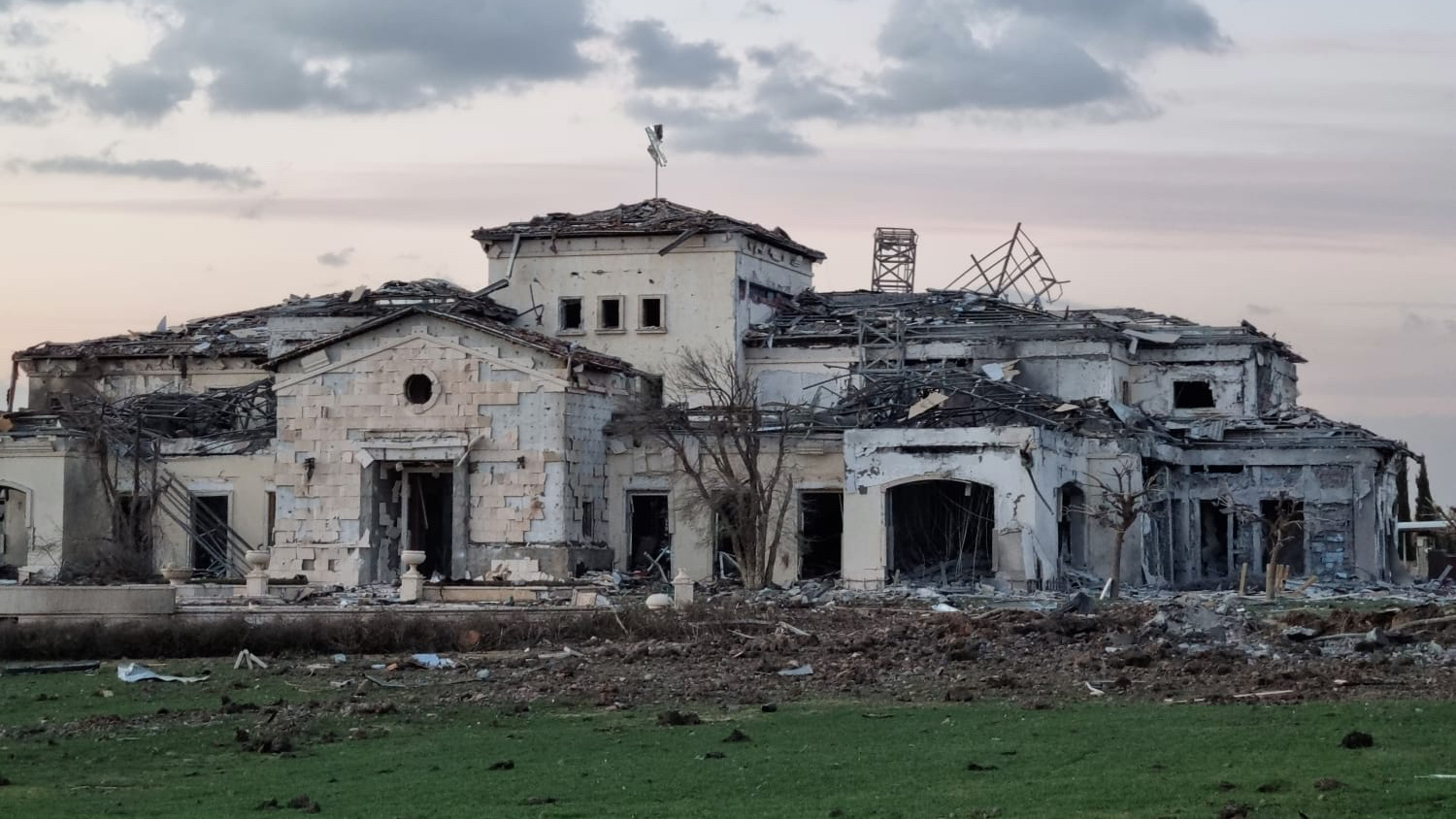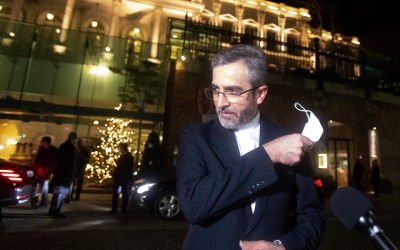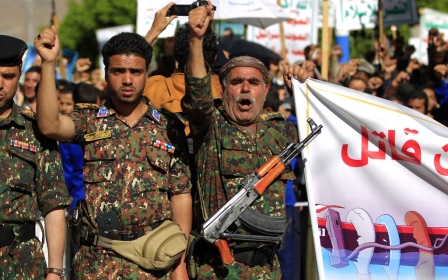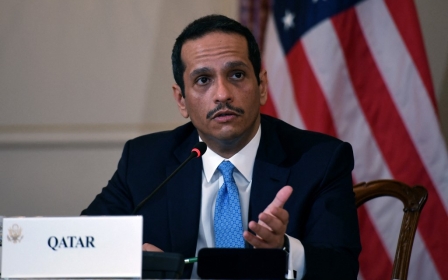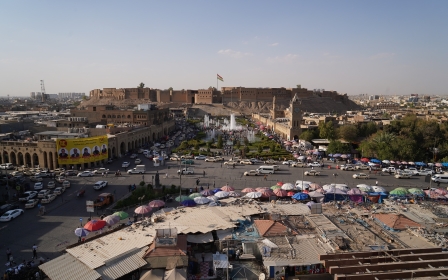Erbil missile strike a response to Israeli sabotage of Iran drone factory, say sources
The ballistic missile attack that targeted Erbil, the capital of Iraq’s semi-autonomous Kurdistan region, is a response to a previous Israeli attack that targeted an Iranian drone factory in the city of Tabriz, Iranian and Iraqi officials told Middle East Eye.
Suggestions it was linked to negotiations over the formation of Iraq’s next government were wide of the mark, they said.
Around 1am on Sunday morning, a dozen ballistic missiles were launched from Iranian territory towards Iraq. Most of them hit a farm 30km north of Erbil, Kurdish officials said.
Iran’s Revolutionary Guard claimed responsibility for the attack. It alleged the missiles targeted Mossad sites in Erbil, saying Iran’s security and peace is a "red line" that no one is allowed to threaten.
New MEE newsletter: Jerusalem Dispatch
Sign up to get the latest insights and analysis on Israel-Palestine, alongside Turkey Unpacked and other MEE newsletters
A senior Iranian official told MEE that the strike was a response to a previous Israeli attack, launched from Iraqi Kurdistan, on a drone factory in the northwestern Iranian city of Tabriz a few weeks ago.
One of Iran’s most important tactical air bases is in Tabriz. It includes an army aviation headquarters, F-5 squadrons and a radar station.
The Iranian official did not give more details about the alleged Tabriz attack, but two major explosions in the city were reported by Iranian media in recent weeks.
The first took place on 4 February in a three-story building in eastern Tabriz’s Yusufabad Abbasi district. Local authorities said at the time that the cause of the explosion was not clear and that at least three people were killed and five buildings damaged.
The second explosion took place on 8 March, affecting several buildings in the Ahmedabad area, injuring four people. Again, local authorities said the cause was not clear.
There was speculation at the time that a gas leak lay behind the blast. But photographs published in the Iranian media showed widespread destruction in both events, inconsistent with a gas leak.
Kurdish authorities said there were no casualties from Sunday’s missile attack. However the Iranian official said that two Israeli officers were killed by the strike.
The Israeli foreign ministry told MEE it is not commenting on the Erbil attack.
Message delivered
The missiles struck close to several under-construction buildings belonging to the US consulate, which is in the process of moving to the site. The Kurdistan 24 TV channel and several nearby houses were also damaged. All the buildings affected were within the same complex.
The US State Department on Monday said that the attack was not directed at the United States and that it did not target any of its facilities in Erbil, adding none of its citizens or contractors were harmed.
Sustaining by far the most damage was a large, two-story villa in a farm located in the complex. The villa is owned by Sheikh Baz Raouf Abdulkarim, CEO of KAR Group.
KAR is a privately owned company established in 1999 in Erbil that mainly focuses on energy projects. Its main headquarters is located in Erbil, but the group has also offices in Turkey, Jordan, the UAE, and United States.
Iraqi officials say the company is owned by the family of Massoud Barzani, Iraqi Kurdistan’s former president, who is also father of the current prime minister of the region and uncle of its president.
'The villa is located in the same compound as the new American consulate, which is still under construction, and it is an open site that is easy to monitor'
- US official
The Revolutionary Guard said the sites targeted by the attack were used by the Mossad to manage and launch operations targeting Iranian national security, however no evidence has emerged to back up this narrative.
On Monday, Abdulkarim and Iraqi Prime Minister Mustafa Kadhimi toured the ruined villa. Kadhimi called on Iran to prove the building was the site of a Mossad cell.
Abdulkarim said his house contained nothing but his family's memories. "They bombed my house with missiles in order to kill everything in it... Nothing remains of our memories and our family archives... Everything is under the rubble," he said.
US officials dismissed the allegation that the villa was used by Mossad.
"The villa is located in the same compound as the new American consulate, which is still under construction, and it is an open site that is easy to monitor, and it is still a construction site where dozens of construction workers are present," one Iraq-based US official told MEE.
"There is a lot of ambiguity surrounding this issue. It is not clear whether the Iranian Revolutionary Guard missed the target, or if the goal was to send a message targeting these sites.”
The US official believes the latter is more likely. “The message has [been] delivered,” they said.
The attack was pre-planned
Iranian officials, leaders of Iran-backed Iraqi armed factions and Iraqi officials close to Tehran told MEE that the Erbil attack was not “arbitrary” or “emotional”.
They said that despite knowing for weeks it was a Mossad “headquarters”, retaliation for the Tabriz attack was postponed due to the positive progress of nuclear talks with the US and other world powers in Vienna.
The Vienna talks, which have been ongoing for 11 weeks, were halted on Friday following new Russian demands, the US’s seizure of Iranian oil shipments and an alleged shifting of positions by Washington.
"The attack was planned to be carried out weeks ago, but the fear of affecting the conduct of negotiations was the obstacle,” the Iranian official told MEE.
"The Iranian Revolutionary Guard is not convinced of the feasibility of these negotiations or the seriousness of the Americans in giving Iran what it wants. They think that they have been very patient and gave al-Ettelaat [the Iranian intelligence service] enough time to implement things their way."
The recent confiscation of an Iranian oil tanker in the Bahamas by the United States, and its refusal to release it despite Iranian demands, has intensified Revolutionary Guard leaders’ anger towards Iranian intelligence officials, sources told MEE.
It "gave them an impetus to escalate", one official said.
Vienna, not Baghdad
Soon after the attack, there was much speculation that the rockets were linked to Iraq’s government-formation process.
Barzani’s Kurdistan Democratic Party (KDP) has been working with Muqtada al-Sadr, the influential Shia cleric who emerged as the biggest winner in the October 2021 elections, to form a large parliamentary coalition that would sideline all or most Iran-backed factions.
The missiles were seen by some as a message to the KDP, which controls Erbil and the Kurdistan regional government, warning it not to exclude the Iranian-backed parties from the next government.
But Iranian and Iraqi officials and western diplomats have ruled the motive out.
"The Iranians are not wasting so many ballistic missiles on an internal Iraqi affair. The latest attack has nothing to do with the political scramble inside Iraq, as much as it has to do with what happened in Vienna," a senior Iraqi political leader close to Iran told MEE.
"The Iranians sent several messages in their attack: one to Israel, the second to the United States, the third to Turkey, and the fourth to the leaders of the Kurdistan region, if they liked to consider it as such.”
Turkey, two US officials said, is likely caught up in the row due to rumours it participated in a heated meeting where Russia’s ambassador to Iraq attempted to convince Turkish and Qatari officials not to help the West diversify from Russian gas following the invasion of Ukraine.
Iran and Russia are allies, though that partnership has been put under strain by the new Russian demands in Vienna.
"They [the Iranians] have clearly told Israel and the United States that their interests and allies are in the Iranian crosshairs, and that the time has come for the Iranian Revolutionary Guard to take back the steering wheel from the Iranian intelligence service,” the senior Iraqi political leader said.
"What happened is an embodiment of the conflict between the Iranian Revolutionary Guard and Iranian intelligence over how to manage Iran's foreign relations. It is clear that the Iranian Revolutionary Guard is returning with force, especially if the United States does not save the Vienna talks and Israel continues its targeting of Iranian military facilities."
This article is available in French on Middle East Eye French edition.
Middle East Eye delivers independent and unrivalled coverage and analysis of the Middle East, North Africa and beyond. To learn more about republishing this content and the associated fees, please fill out this form. More about MEE can be found here.


